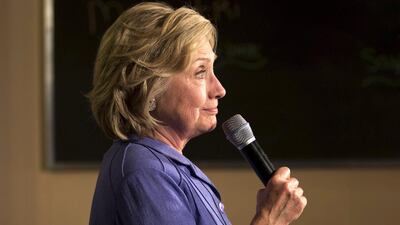To win the cyber war against ISIL, the US must soften the internet and surveillance laws that have made the internet a haven for the jihadist group.
There is little doubt that a major pillar of ISIL’s successful reign of terror is its internet prowess. The jihadist movement skilfully uses social media to communicate to its followers and recruit new foot soldiers by the minute.
Hillary Clinton, the former US secretary of state and a presidential candidate, recently highlighted ISIL’s growing online threat, saying: “We have got to shut down their internet presence, which is posing the principal threat to us.”
Average citizens across the world have answered the call. Groups of hacker-activists are waging a silent war against ISIL, using networks of web-savvy hackers to bring down ISIL-linked websites and social media accounts.
Hacktivists have compiled an impressive record. GhostSec, a hacker group with 12 members, claims to have taken down 130 websites and more than 60,000 social media accounts of ISIL members since January.
Yet hacktivists and the US authorities face a common obstacle in the cyber war on ISIL: American law.
The Computer Fraud and Abuse Act (CFAA) criminalises the distribution of malicious code or the unauthorised altering of the US-hosted computers and servers that ISIL uses.
The distributed denial of service attacks that have been the hacktivists’ trademark tool to take down dozens of ISIL websites and chat forums are considered a crime under US federal law.
Counter-terrorism officials face even tougher limits.
In addition to the CFAA, US authorities such as the FBI must navigate the Foreign Intelligence Surveillance Act (FISA), which requires federal agencies to receive a warrant through the specialised foreign intelligence surveillance court to monitor and intercept communications.
US authorities must also abide by the Fourth Amendment – which prohibits unreasonable search and seizure – and receive a warrant from a judge to access stored data, whether on a smartphone or a computer server.
The waiting time for a warrant can be days or weeks. All the while, ISIL operatives continue to communicate freely and spread their propaganda on the website in question. By the time authorities are able to intercept or shut down the website, the message has already been delivered.
The FBI has dubbed the gap between American laws and the realities of counter-terrorism “going dark”, warning that authorities are no longer able to keep up with web-savvy extremists such as ISIL.
The alarming gap spurred FBI director James Corney to warn the US Congress in July that “we may not be able to identify and stop terrorists who are using social media to recruit, plan and execute an attack in our country”.
But tough surveillance and internet laws have not only weakened the US’s efforts to combat cyber-jihadists, they have attracted them.
Knowing that US-hosted websites are protected under law and rarely monitored, ISIL’s cyber soldiers have turned to American websites and social media platforms in droves.
Intelligence officials say that, as of mid-2015, ISIL almost exclusively uses US-hosted websites as its main channel of communications, propaganda and recruitment.
These cyber-jihadists have particularly been drawn to social media sites such as Twitter that allow cells to communicate via private instant messaging that is shielded from public view and difficult to monitor or track.
The issue has even posed an obstacle to counter-terrorism authorities in the Arab world. Although able to block and take down websites within their jurisdiction, Washington’s Arab allies are unable to touch websites hosted in the US, leaving an even larger gap in online counter-terrorism efforts.
As one security official in an Arab country observed, “when it comes to US sites, we are powerless”. And that is giving more power to ISIL’s followers.
Intelligence officials and security advocates have suggested a series of proposals, including softening internet laws, amendments to FISA and even a special law granting restricted online surveillance powers for a limited time frame.
The Obama administration seems unwilling to act and the US is quickly losing ground.
The US must continue to maintain the balance between freedom of speech, privacy and national security. But in the case of cyber-terrorism and ISIL, it may have to tip the scale.
Taylor Luck is a political analyst and journalist in Amman

